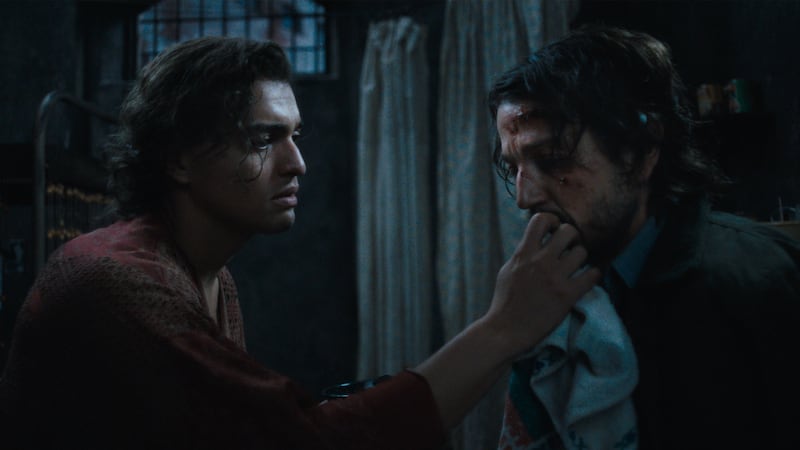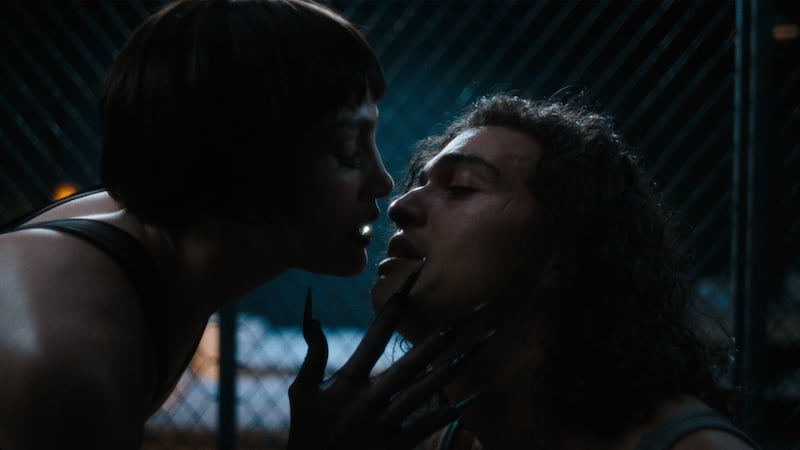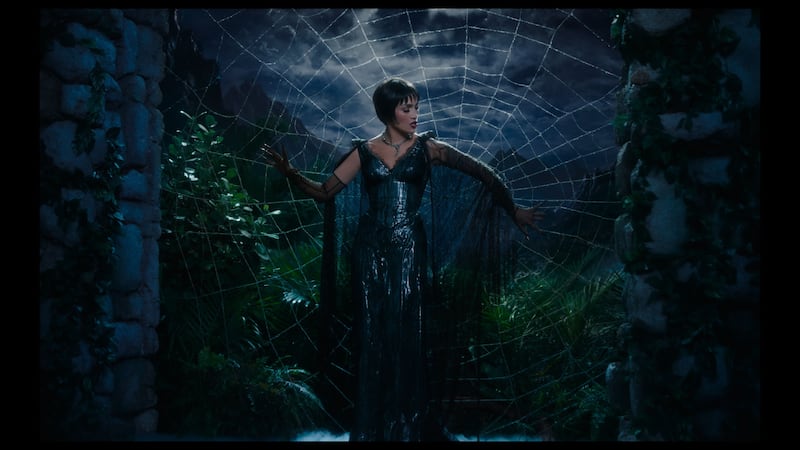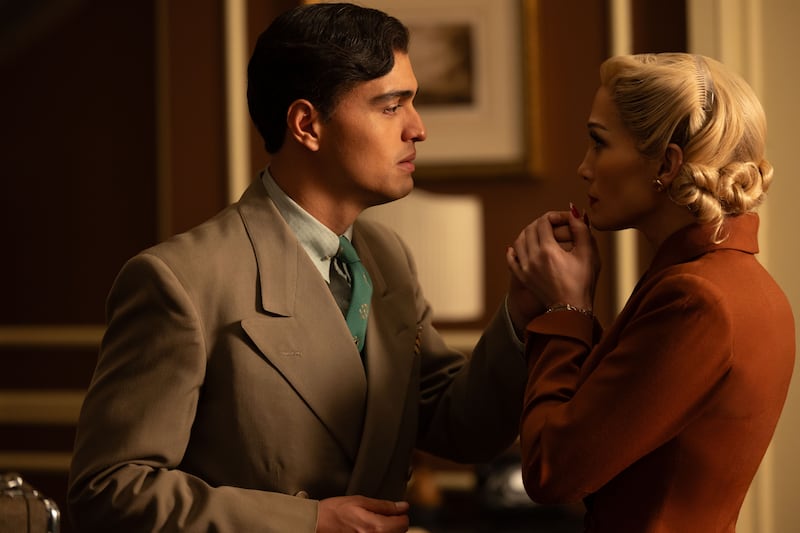Spiders are among the most expeditious species on Earth.
Those delicate, ornate, expertly crafted webs—have you ever stopped to admire them?—they can be whipped up in about 60 minutes. In the time it took me to decide where to order a sandwich from for lunch, a spider has woven a work of art that is also a home…and a trap. It’s beautiful and it’s sinister.
It’s fitting then, that Kiss of the Spider Woman had to be made at a spider’s pace—and its attention to art.
Kiss of the Spider Woman is a movie musical starring Jennifer Lopez, in a part made famous by Broadway icon Chita Rivera. It is its own unique, dangerous tapestry: a persecuted gender-conforming window dresser named Molina (played exquisitely in this production by rising star Tonaituh) is imprisoned alongside a dissident (Diego Luna’s Valentin) protesting a fascist regime in Argentina during the Dirty War.

During their intimate incarceration, Molina embodies the proof of how much culture matters during times of conflict; he also recounts the film history of his favorite actress and her iconic roles, which come to life in movie-within-a-movie scenes anchored by Lopez.
She twists, twirls, and tangos her way through no less than 11 production numbers. The film is directed by Bill Condon, the movie-musical visionary behind Dreamgirls, and he frames each sequence like a classic MGM Golden Age film. Lopez and Tonatiuh—a legend and a breakout star—execute the numbers the way that they would have at the time, in long takes that depict every bit of choreography, from a flick of the ankle to a wink at the camera.
More remarkable, especially once you see those numbers on the big screen, is that this is an independent film, on an independent budget.
“We knew this is not going to have the budget of a Beauty and the Beast or Wicked. It’s not going to have the budget of Dreamgirls,” Condon tells me in a Zoom interview ahead of the Kiss of the Spider Woman release. “Nobody likes a budget musical. They don’t work, you know? So then I thought, those are two hour-and-a-half-hour movies. This is a two-hour movie, so let’s be lavish and full tilt at the musical. And then make this very inexpensive prison movie.”

So he pulled off something miraculous, and also, by virtue of the effort, coincidentally timely.
Because of the talent and work ethic of Lopez, he was able to film 11 full-scale production numbers in 17 days—if you’ve ever questioned Lopez’s talent, my god, watch her in this film.
There’s a scene when Lopez is acting against herself in the film, that Condon giggles remembering that during an early screening, a friend turned to him and said, “Gay heads are going to explode.”
It’s a multiple-detonation event. There’s also a scene that is the climax of the movie, in which Lopez is belting out the title song of the musical, while a gay sex scene is happening. “Were you the one who said, ‘She’s wailing while they’re nailing each other?’” Condon asks. Yes, I have described the iconic sequence that way.

But those lavish, truly spellbinding music sequences are juxtaposed against Molina and Valentin’s life in their prison cell, oppressed, desperate for connection, and enraged enough for a revolution. It’s a story that validates a queer experience, that centers the Latin experience, and underscores the risk involved in standing against an authoritarian regime that wants to take those experiences away—not to mention, basic human rights.
“When I look at someone like Jennifer, who’s been quite literally on the world stage for so many years and Diego to do the same, to say these kinds of messaging, it’s fascinating that maybe there is this level of Latin excellence that has to exist because we don’t get an opportunity to fail,” Toniatiuh tells me.
Toniatiuh is the essential thread of this spider web.
He was, he tells me, literally the last person auditioned to play Molina after a casting search of thousands; William Hurt won an Oscar for playing the part in the 1985 movie.

During what is essentially considered Hollywood’s extended vacation, where no one answers an email, he was asked to submit a self-tape audition. Next thing he knew, he was learning Bob Fosse-esque choreography, performing for the director of Dreamgirls, and doing a chemistry read with Diego Luna.
“Molina is the emotional center of the movie, but then it became a process because obviously it was about chemistry with Diego. But more than that, we were casting two parts,” Condon says.
Toniatiuh doesn’t just play Molina in the tender and brutal prison scenes opposite Luna’s Valentin. He appears in the movie-within-a-movie fantasy sequences, where he sings, dances, and swoons as a classic Hollywood leading man opposite Lopez.

“To not just do one movie, but two, a classic Hollywood 1940s-style musical, as well as a naturalistic drama, two-hand play, essentially,” says Toniatiuh, still grappling with his leading-man debut. “To tell a character that was a classic, Gene Kelly, Errol Flynn, Montgomery Clift silhouette, and then a genderless expression like Molina, who is so, um, full of life and nerve. It was dynamic.”
Condon laughs that he’s glad no one before him made this musical into a movie, so he could put his stamp on it. But he also earnestly explains why he thinks it clicks—echoing somewhat of a mission statement he’s had his entire career.
“Molina says, ‘Call a kitsch, call it camp. I don’t care. I love it.’ To me, that’s something I think I’ve said in real life a number of times,” Condon says. “I could almost use it as an occasional defense for some of the movies I’ve made too. I put it into Mo’s mouth, some of the defense of a certain kind of filmmaking that I adore.”
What a web he weaves.
The post J.Lo’s New Film Is a Movie Musical Miracle Impossible to Pull Off appeared first on The Daily Beast.




